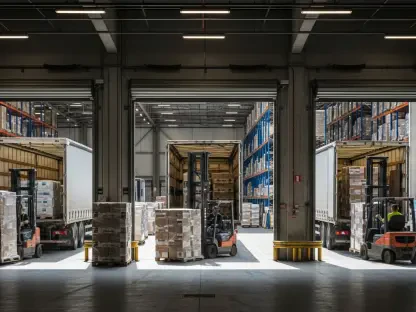In a surprising turn of events that has sent ripples through the food manufacturing sector, PepsiCo has announced the closure of two Frito-Lay facilities in Orlando, Florida, affecting hundreds of workers and signaling deeper challenges within the snack food industry. This decision, impacting a significant manufacturing plant and associated warehouses, comes as consumer spending on discretionary items like snacks continues to decline amid economic pressures and shifting dietary preferences. As one of the leading players in the packaged food market, PepsiCo’s actions reflect not just internal strategic shifts but also broader industry trends that are forcing companies to rethink their operational models. With inflation curbing budgets and a growing consumer inclination toward healthier eating, the closures highlight a critical juncture for snack giants navigating an increasingly complex market landscape. This development raises questions about how major food companies can adapt to sustain growth in such turbulent times.
Economic Pressures and Market Shifts
Navigating Inflation and Reduced Consumer Spending
The decision by PepsiCo to close key Frito-Lay facilities in Florida stems largely from the economic headwinds that have dampened consumer spending on non-essential items. With inflation impacting household budgets across the nation, many shoppers are prioritizing necessities over indulgent snacks, leading to a noticeable drop in sales volumes for popular brands under the Frito-Lay umbrella. The company reported a 2% decline in both revenue and product volume for its North American food unit this year, a clear indicator of the financial strain felt by consumers. This downturn has prompted a reevaluation of production capacities, with the closures in Orlando—affecting 500 workers—being a direct response to align output with diminished demand. Beyond just numbers, this move underscores a broader challenge for the industry as discretionary purchases become a lower priority for cost-conscious families facing rising living expenses.
Industry-Wide Responses to Economic Challenges
Beyond PepsiCo’s specific actions, the broader food manufacturing sector is grappling with similar economic constraints, leading to a wave of operational adjustments across major players. Companies like General Mills and Conagra Brands have also resorted to shutting down plants and reducing staff to match production with slowing demand. This collective response highlights a shared struggle to maintain profitability when consumers are tightening their belts. In Florida alone, the ripple effects of such closures extend to local economies, with hundreds of jobs lost and communities bracing for the fallout. While PepsiCo has committed to supporting affected employees with transition assistance and career resources, the scale of these layoffs paints a grim picture of an industry under pressure. The focus now shifts to how effectively these giants can streamline costs without sacrificing market presence in a highly competitive space.
Consumer Trends and Strategic Adaptation
Shifting Preferences Toward Healthier Options
A significant driver behind the declining sales of traditional snacks is the evolving consumer preference for healthier dietary choices, a trend that has reshaped the food industry landscape. Modern shoppers are increasingly seeking products with natural ingredients, minimal processing, and transparent labeling, often bypassing classic offerings like chips and salty snacks in favor of alternatives perceived as better for wellness. This cultural shift has hit brands under Frito-Lay hard, as their core products face scrutiny for high sodium and artificial additives. PepsiCo has acknowledged this change by innovating within its portfolio, introducing variations of popular snacks made with olive or avocado oil and without artificial colors or flavors. However, adapting to these preferences while maintaining brand identity poses a complex challenge, especially when consumer trust in processed foods continues to wane amid broader health consciousness.
Product Innovation and Market Repositioning
In response to these changing tastes, PepsiCo has taken proactive steps to reposition Frito-Lay in the market through targeted product adjustments and pricing strategies. Smaller pack sizes and lower-cost options have been rolled out to appeal to budget-conscious consumers, while packaging now often emphasizes natural components like real potatoes to counter perceptions of over-processing. These efforts aim to recapture interest from a demographic increasingly drawn to wellness-focused brands, yet the effectiveness of such initiatives remains under scrutiny as sales figures continue to lag. Additionally, the closures in Florida and other states signal a parallel strategy of cost reduction to fund innovation and marketing pushes. As competitors follow suit with similar reformulations and operational cuts, the snack sector finds itself at a pivotal moment where balancing tradition with transformation is key to regaining consumer loyalty and market share.
Reflecting on Industry Challenges
Lessons from Operational Downsizing
Looking back, PepsiCo’s decision to close Frito-Lay facilities in Florida emerged as a stark reflection of the intense pressures that defined the snack food industry during a challenging period. The shuttering of a major manufacturing plant and warehouses in Orlando, which resulted in 500 job losses, was a calculated move to address a 2% drop in sales and revenue driven by economic constraints and shifting consumer habits. This wasn’t an isolated incident but part of a broader pattern, with similar closures in states like New York and Michigan underscoring the depth of the struggle. The company’s focus on supporting displaced workers through benefits and career assistance highlighted a commitment to mitigating human impact, yet it couldn’t mask the harsh reality of an industry forced to downsize. These actions painted a picture of a sector compelled to make tough choices to survive in a market no longer favoring unchecked expansion.
Future Pathways for Adaptation
As the dust settled on these closures, attention turned to the strategic pathways forward for PepsiCo and its peers in the packaged food arena. The dual challenge of economic inflation and a consumer pivot to healthier eating necessitated more than just operational cuts; it demanded a rethinking of product relevance in a crowded market. Moving ahead, sustained investment in innovation—whether through healthier snack formulations or accessible pricing—stands as a critical next step. Additionally, enhancing supply chain efficiencies could offer a buffer against future economic downturns, ensuring agility in response to demand fluctuations. Collaboration with local communities to lessen the blow of job losses might also rebuild trust and brand goodwill. Ultimately, the journey ahead for snack giants hinges on their ability to anticipate consumer needs while maintaining financial stability, a balancing act that will define their resilience in an ever-evolving industry landscape.









